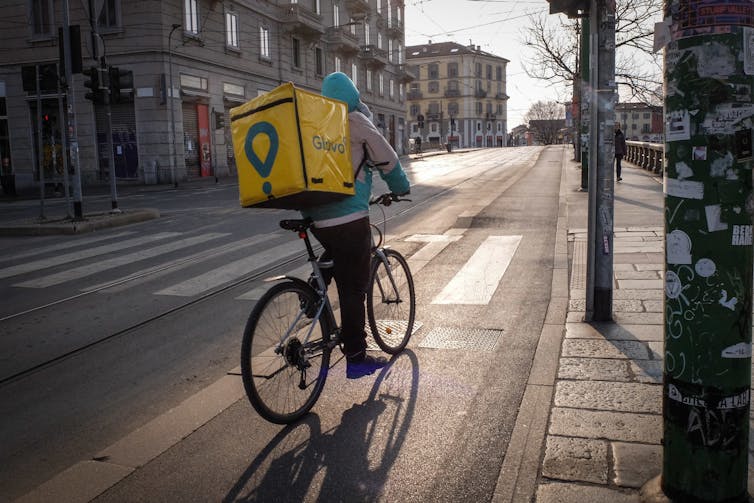Delivery workers are now essential. They deserve the rights of other employees
- Written by Tyler Riordan, PhD Candidate, The University of Queensland
Along with home delivery of groceries[1], pharmaceuticals[2] and alcohol[3], demand for food delivery is booming.
Services such as Uber Eats and Deliveroo have become essential to cafes and restaurants that can now only sell takeaway food.
It is good news for the likes of Uber, whose stock price has risen since it announced a ten-fold increase in the number of restaurants signing themselves up to Uber Eats[4].
But it’s a situation that has provoked serious questions. Not only about whether delivery services are safe, but whether it’s ethical to use them[5].
Digital platforms like Uber Eats and Menulog are not, after all, ideal employers. In fact, they don’t regard themselves as employers at all, merely facilitators of work by “independent contractors”.
Food delivery drivers and riders often work for less than the minimum wage[6], and have no employee rights such as sick leave.
Now we are collectively relying on them to provide an essential service during social distancing, we need to ask what, as a society, we owe these workers in return.
Vulnerable to exploitation
We’re interested in how this economic crisis affects food delivery drivers and riders due to our research into the experience of migrant gig workers.
Our research has found migrants are already “socially distanced”, without deep networks of family or friends. They are vulnerable to exploitation and discrimination.
Most food delivery work is done by migrants, through third-party digital platforms like Uber Eats and Menulog. The platforms treat drivers and riders as independent contractors, not employees with the protections and rights of employees.
Read more: Redefining workers in the platform economy: lessons from the Foodora bunfight[7]
A 2019 survey commissioned by the Victorian government[8] suggested about 7% of the workforce used digital platforms to get gig work, the most common being Airtasker (35%), Uber (23%), Freelancer (12%), Uber Eats (11%) and Deliveroo (8%).
 A delivery rider in Milan, Italy, 22 March 2020.
Matteo Corner/EPA
A delivery rider in Milan, Italy, 22 March 2020.
Matteo Corner/EPA
Previous research suggests many choose gig work[9] simply because it is better than other forms of low-paid work.
Now food delivery workers face pressure from those displaced from such jobs in hospitality or retail. Complicating the situation is the lack of clarity about whether those on temporary work visas are eligible for income support[10] announced for other workers.
Platforms don’t owe gig workers a minimum wage so can sign up as many “independent contractors” as they like. This improves the service for customers, and increases profit for the platform, but means individual deliverers make less money.
Increased health risks
Many delivery services are implementing contactless delivery[11] procedures. But the lack of defined employer responsibility in the platform economy means patchy attention to the extra physical and mental health risks gig workers now face.
Unions and others have urged delivery platforms to provide protective equipment[12] such as gloves, face masks and sanitisers. Responses from platforms have been limited.
This was Uber Eats’ response on March 17, by its regional general manager for the Asia Pacific, Jodie Auster[13]:
Our plan to address challenges born by COVID-19 includes making A$5 million in funding available for independent restaurants across Australia and New Zealand. The multi-million dollar fund will allow restaurants to deploy promotions to attract customers and will help restaurants time promotions to suit their individual business needs.
What Auster didn’t mention was a plan to issue safety gear, though she did note the company had started a campaign “reminding Uber Eats users that they can request deliveries be left on their doorsteps”.
Not surprisingly, delivery workers are scared they will catch the coronavirus[14].
Uber says it will financially assist drivers and riders “diagnosed with COVID-19 or placed in quarantine by a public health authority” for a period of up to 14 days[15].
But what if a worker with viral symptoms wants to self-isolate as a precaution? There’s no sick leave or workers compensation, and they risk “deactivation” if work isn’t accepted.
Read more: Workers' compensation doesn't cover gig workers – here's a way to protect them[16]
Legal protection
Social distancing measures mean the delivery economy and the health of the general population are now intimately linked.
To secure and safeguard this now essential service, it is time the law ensured gig workers have the same legal rights and protections as other employees.
Read more: How to stop workers being exploited in the gig economy[17]
We need the delivery drivers coming to our doors to be healthy. That health depends on their safety as well as economic and social inclusion[18].
References
- ^ groceries (insidefmcg.com.au)
- ^ pharmaceuticals (theconversation.com)
- ^ alcohol (www.businessinsider.com.au)
- ^ Uber Eats (au.finance.yahoo.com)
- ^ whether it’s ethical to use them (www.abc.net.au)
- ^ less than the minimum wage (www.theguardian.com)
- ^ Redefining workers in the platform economy: lessons from the Foodora bunfight (theconversation.com)
- ^ commissioned by the Victorian government (www.premier.vic.gov.au)
- ^ many choose gig work (theconversation.com)
- ^ eligible for income support (www.theguardian.com)
- ^ implementing contactless delivery (www.huffingtonpost.com.au)
- ^ to provide protective equipment (www.abc.net.au)
- ^ Jodie Auster (www.uber.com)
- ^ they will catch the coronavirus (www.abc.net.au)
- ^ up to 14 days (www.uber.com)
- ^ Workers' compensation doesn't cover gig workers – here's a way to protect them (theconversation.com)
- ^ How to stop workers being exploited in the gig economy (theconversation.com)
- ^ economic and social inclusion (www.theguardian.com)
Authors: Tyler Riordan, PhD Candidate, The University of Queensland














